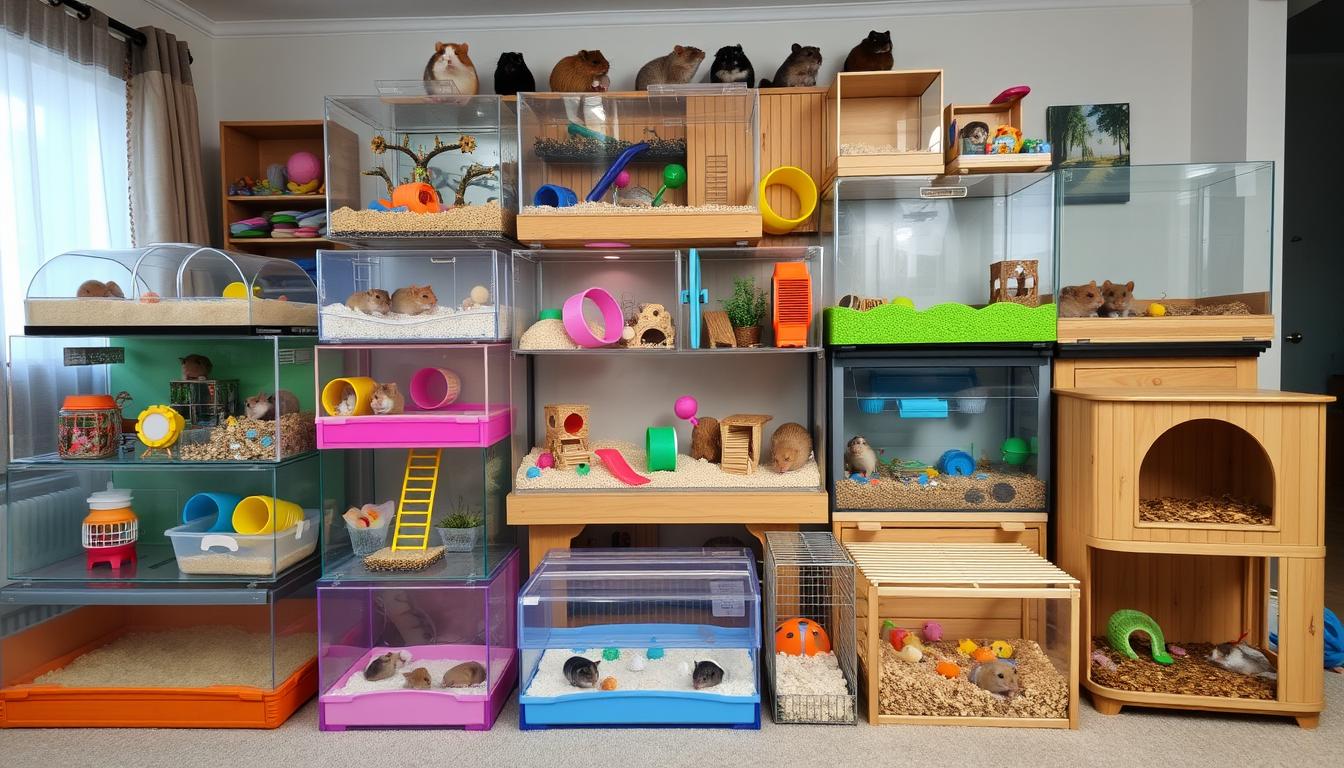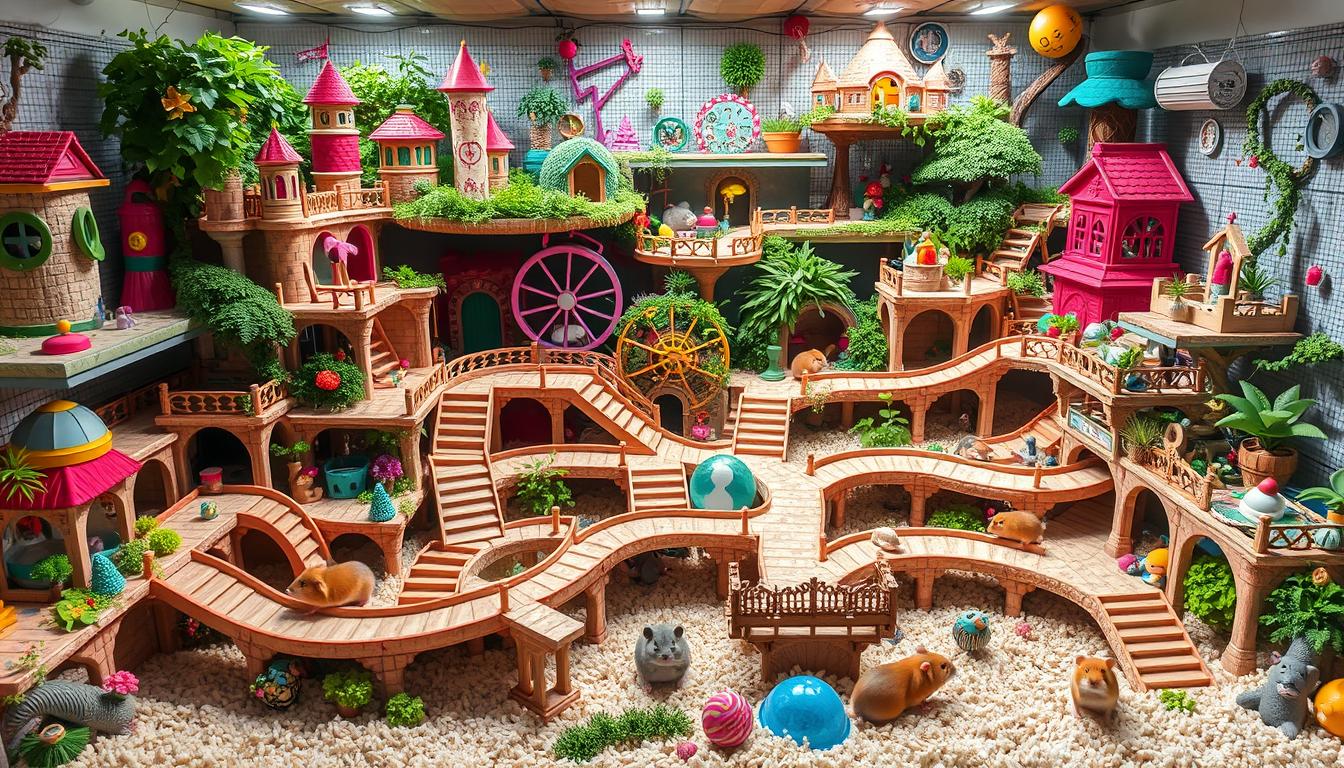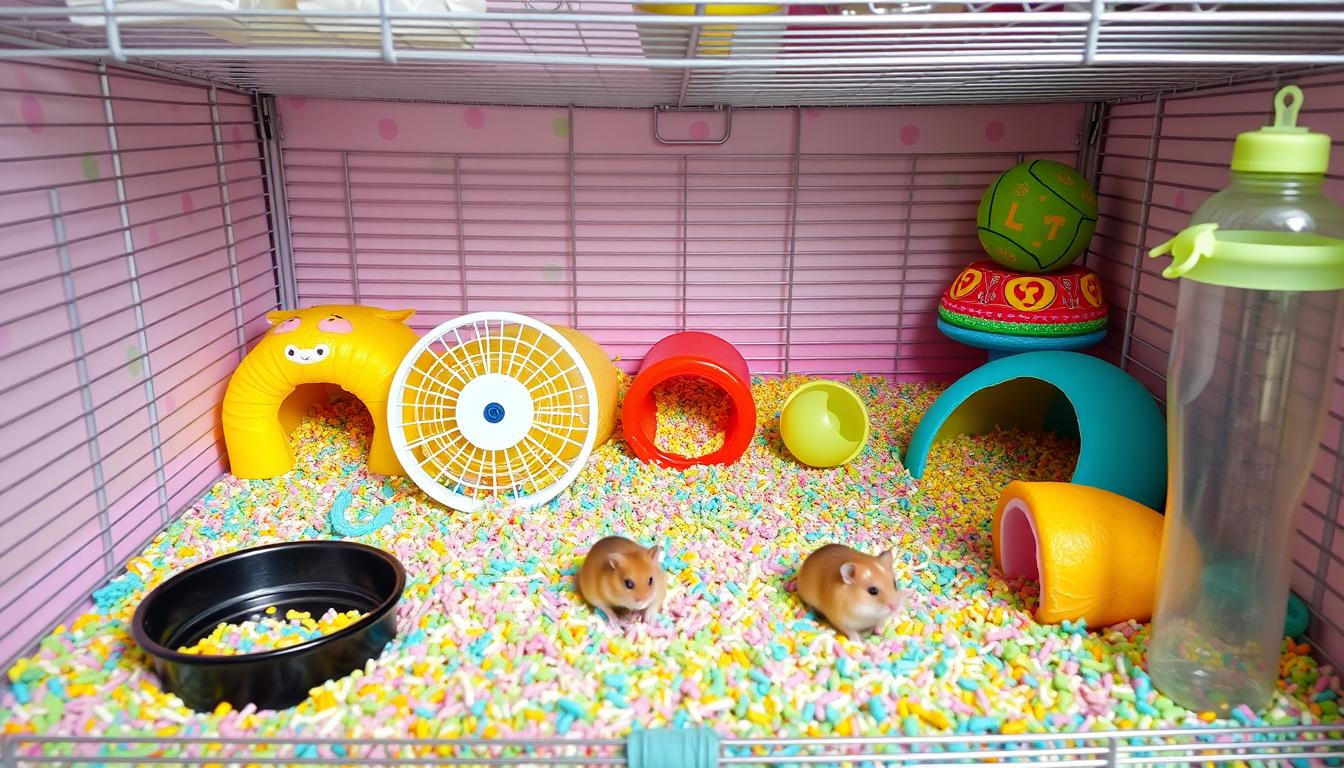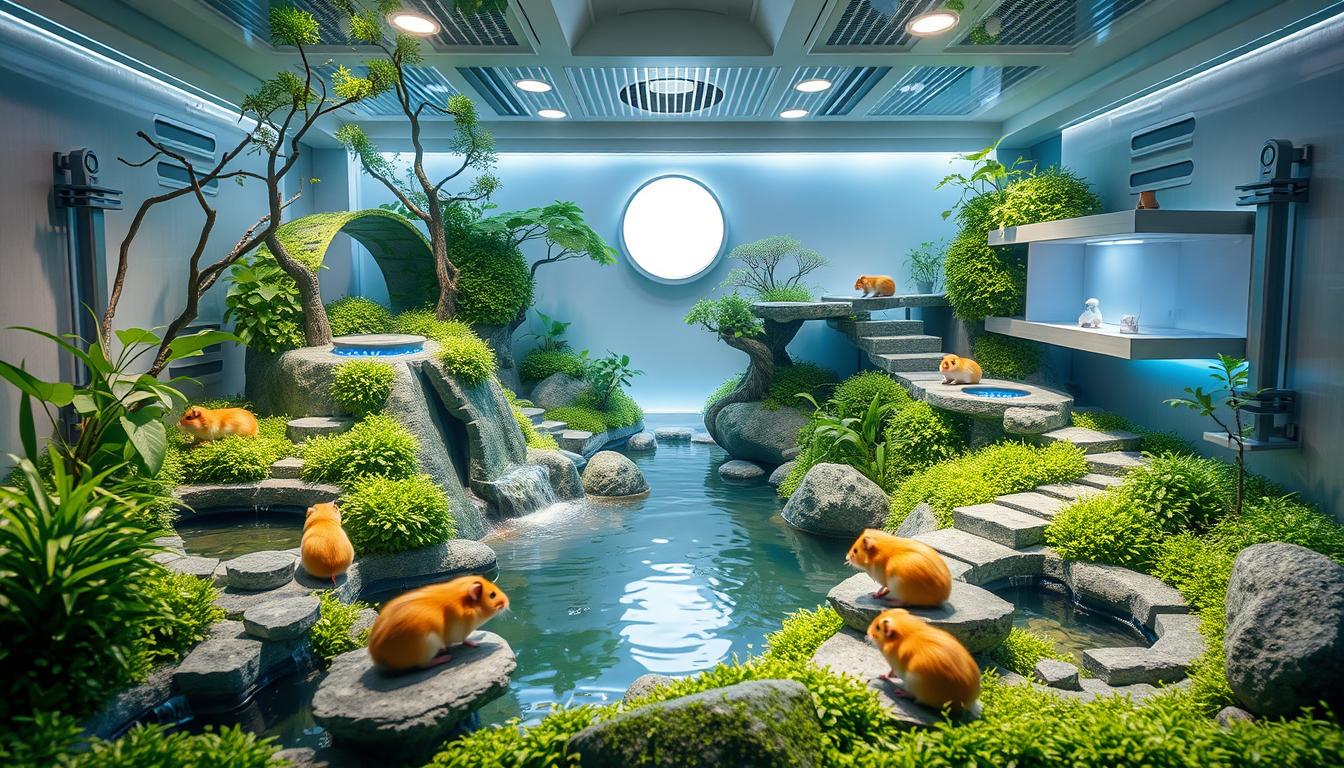Are you a hamster enthusiast looking for the best home for your furry friend? This guide is for you! We’ll look at the top 10 hamster cages on the market. They offer comfort, safety, and lots of space for your small pet.
We’ll cover different types, materials, and sizes of cages. This will help you choose the right one for your pet.
Key Takeaways
- Discover the top-rated hamster cages that provide the best living environment for your pet
- Learn about the key factors to consider when choosing the perfect cage, including size, ventilation, and accessibility
- Explore the pros and cons of different cage materials like plastic, glass, and metal to make an informed decision
- Get insights into the various types of hamster cages, including wire, aquarium, and modular designs
- Find out how to set up and maintain your hamster’s new home for maximum comfort and happiness
Ready to give your beloved hamster the ultimate living space? Dive into our top picks guide and find the perfect cage that will make your furry friend’s heart sing!
Why Choosing the Right Hamster Cage Matters
Choosing the ideal hamster cage is key for your hamster’s health and happiness. The cage’s environment affects your hamster’s physical and mental health. It’s important to know what different hamster breeds need and how space and environment help them thrive.
Impact on Your Hamster’s Health and Happiness
A properly sized hamster cage lets your pet move, exercise, and behave naturally. Too little space can cause stress, boredom, and health problems. On the other hand, a large hamster cage lets your hamster explore, burrow, and play, keeping them happy and healthy.
Understanding Different Hamster Breeds
- Dwarf hamsters, like Roborovski and Campbell’s, need smaller spaces than Syrian or Golden hamsters.
- Dwarf hamsters do well in smaller, more confined spaces. Syrian hamsters need larger, more spacious enclosures for their active lives.
- It’s vital to know your hamster breed’s needs when picking the right hamster cage size and design.
The Role of Space and Environment in Well-Being
Creating a stimulating environment is crucial for your hamster’s health. A large hamster cage lets you add toys, hiding spots, and nesting materials. This encourages natural behaviors and prevents boredom. Good ventilation and visibility are also key for your hamster’s comfort and well-being.
“A happy and healthy hamster is one that has ample space to explore, play, and express their natural behaviors.”
Key Features of the Best Hamster Cages
Choosing the right hamster cage is key for your pet’s comfort and safety. Size, ventilation, and easy cleaning are crucial. These features affect your hamster’s health and happiness.
Size and Space Requirements
Size matters a lot when picking a hamster cage. Hamsters love to run and burrow, so they need lots of space. A cage should be at least 24 inches by 12 inches, with a height of 12 inches. But, bigger cages are even better for your hamster’s happiness.
Look for cages with plenty of room. This lets your hamster move around and act naturally.
Ventilation and Visibility
Good ventilation is vital for your hamster’s health. The best cages have airflow systems that keep air fresh. This prevents bad smells and lets your hamster breathe well.
The cage should also be easy to see into. This lets you watch your hamster and check they’re doing well.
Easy Access for Hamster Cage Cleaning
Cleaning the cage is important for your hamster’s health. Choose cages that are easy to clean. Look for ones with removable trays or wide-open doors.
This makes cleaning quick and easy. It keeps your hamster’s home clean and fresh.
By focusing on these features, you can create a great home for your hamster. It shows you care about their well-being and happiness.
Top Materials for Hamster Cages
Choosing the right material for your hamster’s cage is important. There are many options, each with its own good and bad points. Let’s look at the pros and cons of plastic hamster cages, wooden cages, and others.
Plastic vs. Glass vs. Metal
Plastic cages are popular for being durable, easy to clean, and affordable. They are light and come in many shapes and sizes. But, some plastic cages might give off harmful fumes or not have enough air. So, it’s key to check the specific models before buying.
Glass tanks are great for seeing your hamster and look sleek. They are heavy and cost more, but they let in air well and keep temperature steady. The only problem is that hamsters might get hurt if they try to climb the smooth sides.
Metal wire cages are strong and let in lots of air and space. They are cheaper than glass or plastic. But, they might not keep temperature steady and could hurt your hamster if they get caught in the wires.
Safety Considerations for Your Pet
It’s very important to think about your hamster’s safety when picking a cage. Make sure the cage can’t be escaped from and has safe lids or doors. Also, make sure any toys or decorations don’t have sharp edges or small holes that could trap your hamster. Choose materials that are safe and can handle your hamster’s chewing.
| Material | Pros | Cons |
|---|---|---|
| Plastic |
|
|
| Glass |
|
|
| Metal |
|
|
Remember, your hamster’s safety and happiness should always come first when choosing a cage. Take your time to research and compare options to make sure your hamster has a great place to live.
Popular Types of Hamster Cages
Choosing the right best hamster cage is key to your pet’s health and happiness. There are many options, like wire cages, aquariums, and modular systems. Each has its own benefits and drawbacks.
Wire Cages: Benefits and Drawbacks
Wire cages are popular for large hamster cages. They offer lots of space, good airflow, and easy access. This makes it great for watching and playing with your hamster.
But, wire cages can be risky if the bars are too far apart. Your hamster might get hurt trying to squeeze through or get a limb stuck.
Aquarium Cages: Are They Suitable?
Aquarium-style cages are another good choice. They are secure, with clear views for your hamster. The solid walls keep your pet safe, and they often have more room than wire cages.
But, they might not have enough airflow. This could cause health problems if not well-ventilated.
Modular and Multi-Level Cages Explained
Modular and multi-level cages are perfect for curious hamsters. They have different levels and areas for your pet to explore. This can keep them active and happy.
But, setting up and keeping these cages safe can be more challenging. You need to make sure your hamster is protected.
Choosing the best hamster cage depends on your needs and your hamster’s needs. Knowing the good and bad of each cage helps you pick the right one. This ensures your pet is happy and healthy in their new home.
Best Hamster Cages on the Market
Choosing the right hamster cage is key for your pet’s health. We’ve picked the top 5 hamster cages based on research and user feedback. These cages offer the best size, ventilation, and access for your hamster’s comfort and joy.
Criteria for Selecting the Best
We looked at several important factors for the best hamster cages. These include:
- Enough space for natural burrowing and exploration
- Good ventilation for a healthy, fresh environment
- Easy cleaning and interaction access
- Durable, safe materials for your hamster’s health
- Positive reviews and high customer satisfaction
Review of Top 5 Hamster Cages
After thorough evaluation, here are the top 5 hamster cages:
- Prevue Pet Products 528 Universal Small Animal Home – This cage has lots of space, great ventilation, and a multi-level design for a fun living space.
- Kaytee CritterTrail One-Level Habitat – It’s a favorite for its big acrylic panel design, offering clear visibility and easy access.
- IRIS USA Hamster/Gerbil Cage – This cage has a strong plastic base and metal wire top, perfect for customizing your hamster’s home.
- Ferplast Hamster Cage – Its sleek, glass design provides a natural, stress-free home for your hamster with lots of room and visibility.
- MEKO Hamster Cage – This cage is versatile and multi-level, with fun features like exercise wheels, tunnels, and platforms.
User Feedback: What Other Owners Say
Happy hamster owners love these top cages for their quality and ease of use. They say these cages have greatly improved their pets’ lives. For example, one owner said, “My hamster loves the Prevue Pet Products cage. The extra levels and space have really changed their behavior and activity.”
Setting Up Your Hamster Cage
Creating the perfect home for your hamster is key to their health and happiness. When setting up the best hamster cage, remember a few important things. These include essential accessories and design tips.
Essential Accessories for Comfort
To keep your hamster comfortable and happy, include these accessories in their cage:
- Soft, absorbent bedding for a cozy spot
- Chew toys and tunnels for burrowing and exploring
- A sturdy exercise wheel for daily exercise
- Easy-to-access, spill-proof food and water dishes
Tips for Optimal Cage Design
For the best hamster cages, follow these design tips:
- Use multi-level platforms or a second story for vertical space
- Choose a cage with good ventilation and visibility
- Arrange accessories to encourage natural behaviors and exploration
Common Mistakes to Avoid
Avoid these common mistakes to keep your hamster safe:
- Don’t overcrowd the cage with too many items
- Make sure the cage is big enough for your hamster
- Regularly clean and maintain the hamster cage accessories
With the right hamster cage accessories and design, you can make a great home for your hamster. They will be happy and healthy.
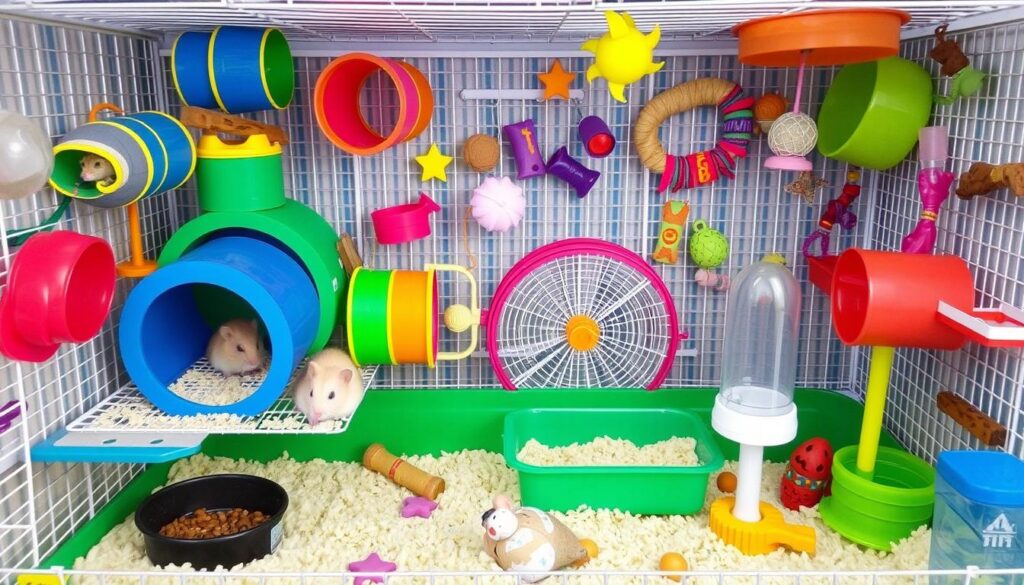
Maintaining Your Hamster Cage
Keeping your hamster’s cage clean is key for their health. A regular cleaning routine and best practices ensure a comfy, clean home for your furry friend.
Cleaning Routine and Best Practices
Clean your hamster’s cage at least once a week. Remove all bedding and disinfect with a pet-safe solution. Clean all surfaces, including walls, floor, and accessories, to remove dirt and debris.
Focus on areas where your hamster spends most time. This includes their nesting area and food and water bowls. These spots tend to get messy faster.
Managing Odors and Hygiene
Hamsters are clean animals, but their waste can cause bad smells. Use a deodorizing spray or baking soda to keep your hamster cage smelling fresh.
Choose best hamster cages that are well-ventilated. This helps keep air flowing and prevents smells from building up.
Frequency of Changes and Upkeep
You might need to clean or change bedding more often, depending on your hamster’s cage size and habits. Watch the bedding’s condition and replace it if it gets too dirty or wet.
Regular care and attention to your hamster’s cage keep it clean. This also helps their health and happiness.
Accessories to Consider for Your Hamster Cage
Choosing the right accessories can make a big difference for your hamster. From safe bedding to fun toys, there’s a lot to pick from. These items help make your hamster’s cage a happy and engaging place.
Types of Bedding: Safety and Comfort
The bedding you choose is key to your hamster’s health. Go for soft, absorbent materials like aspen shavings or paper-based bedding. Stay away from cedar or pine, as they can harm your hamster’s breathing. Always change the bedding to keep things clean and safe.
Fun Toys and Activities to Engage Your Hamster
It’s important to keep your hamster active and mentally sharp. Add items like exercise wheels, tunnels, and chew toys. These encourage natural behaviors like burrowing and climbing. Switch out these toys often to keep things interesting for your hamster.
Food and Water Dispensers: Choosing Wisely
Make sure your hamster has clean water and good food. Choose [hamster cage accessories] like bottle-style water dispensers and sturdy food bowls. These help keep your hamster healthy by providing a steady supply of water and food.
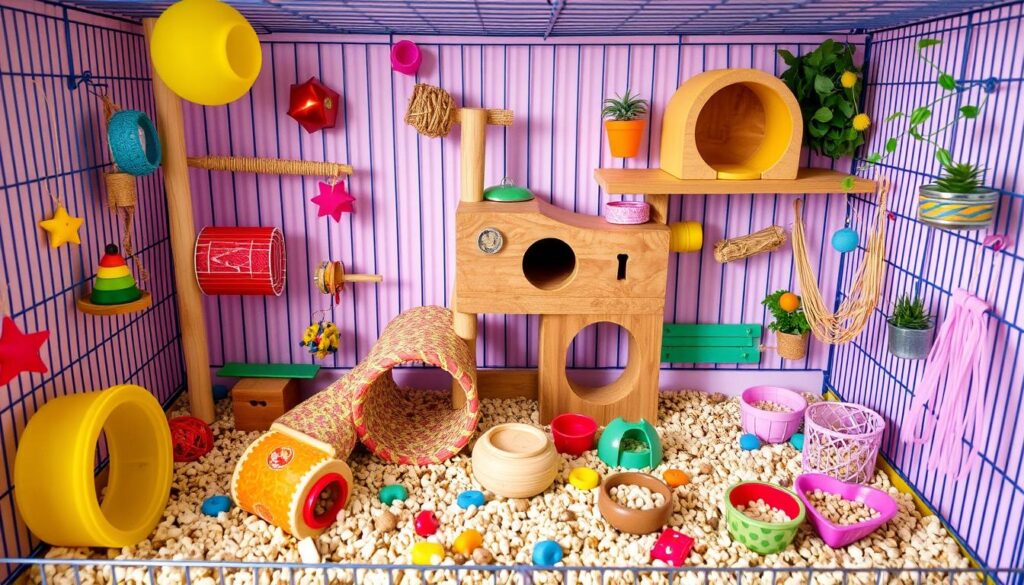
| Accessory | Importance | Recommended Options |
|---|---|---|
| Bedding | Provides comfort, safety, and absorbency | Aspen shavings, paper-based bedding |
| Toys | Encourages natural behaviors and mental stimulation | Exercise wheels, tunnels, chew toys |
| Food and Water Dispensers | Ensures consistent access to essential resources | Bottle-style water dispensers, sturdy food bowls |
“Creating a stimulating and comfortable environment for your hamster is crucial for their overall well-being and happiness.”
By picking the right [affordable hamster cages] and accessories, you can make your hamster’s cage a perfect home. A well-thought-out habitat is key to your hamster’s health and happiness.
Additional Tips for Creating a Happy Home
Creating a great home for your hamster is more than just the right cage. It’s about making their space special and keeping them happy. Knowing how to spot stress and the value of social time helps make a perfect home for your hamster.
Personalizing Your Hamster’s Space
Hamsters love cozy, familiar places. Adding personal touches that fit their likes can make a big difference. This might include:
- Offering different nesting materials like shredded paper or soft fabrics for burrowing
- Adding tunnels, hideaways, and platforms for them to explore
- Putting out toys and chew items to keep them curious and active
- Using their favorite treats as rewards and fun snacks
Watching for Signs of Stress in Hamsters
It’s important to watch how your hamster acts and feels. Look out for signs of stress, like:
- Too much grooming or losing a lot of fur
- Eating less or changing how they eat
- Burrowing or hiding too much
- Being too scared or aggressive when you try to touch them
If you see these signs, it might be time to change their cage or environment to make them feel better.
Importance of Social Interaction
Hamsters love being around people and enjoy interacting with them. Spend time with your hamster every day doing gentle activities, playing, and giving them treats. This helps you bond and keeps your hamster happy and healthy.
By making their space special, understanding their needs, and spending quality time together, you can make a happy home for your hamster.
Conclusion: Selecting the Best Hamster Cage for You
Choosing the right hamster cage is key for your pet’s health and happiness. Think about size, ventilation, and cleaning ease. This will help create a safe and comfy home for your hamster.
Recap of Key Factors to Keep in Mind
When picking a hamster cage, remember size and ventilation. Also, think about cleaning ease. Look into different materials and their safety for your hamster.
Final Thoughts on Hamster Care
Good living conditions are vital for your hamster. A quality cage and proper care will make your pet happy and healthy. Always put your hamster’s happiness first.
Encouragement to Make an Informed Decision
This guide should help you choose the best hamster cage. Do your research and pick wisely. Your hamster will appreciate it and live a happy life.

